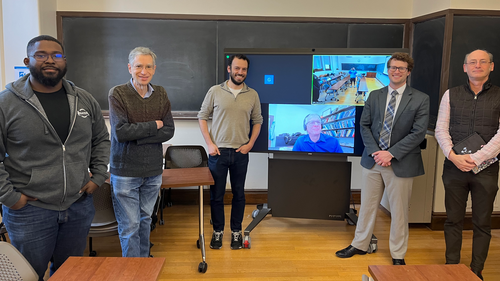
On April 12, Grant Schumacher successfully defended the thesis “Stability of a Three-Component Fermi Gas” (advisor: Nir Navon).
Grant explained, “Understanding how systems decay can reveal their microscopic properties. In my thesis work, I characterized the decay of a three-component atomic gas, which revealed surprising (and currently unexplained) losses. These results contradict previous assumptions about the behavior of these systems and open an interesting problem for few-body theory.”
In the fall he will join Susquehanna International Group as a quantitative researcher.
Thesis abstract:
Ultracold quantum gases have proven to be powerful platforms for quantum simulation, due to their precision and tunability. In particular, ultracold gas experiments have made many fundamental contributions to understanding the two-component (spin-1/2) Fermi gas. Utilizing higher spin systems would open far-reaching opportunities for quantum simulation, such as SU(N) Fermi gases, however such experiments have been much rarer.
Here I report our experiments characterizing the stability of the three-component Fermi gas. This system displays loss resonances related to Efimov physics, however previous experimental work was restricted to studying the spin-balanced (unpolarized) gas in harmonic traps. We expand on these measurements by studying the stability of a uniform system with controllable polarization. We find anomalous loss behavior that qualitatively disagrees with previous assumptions about the nature of these losses. We develop a generalized loss equation to model this behavior, and we systematically rule out various technical explanations. Finally, we present a conjectural model which may hint at the ultimate explanation of this surprising behavior.